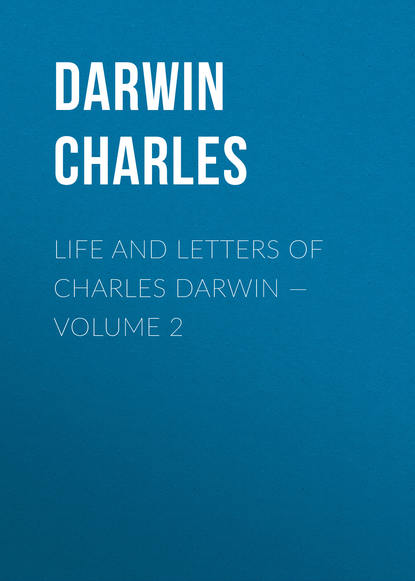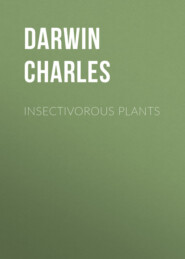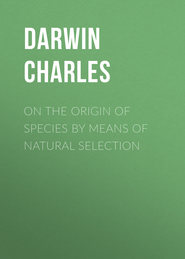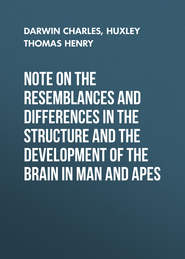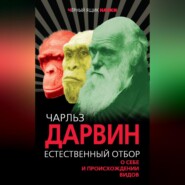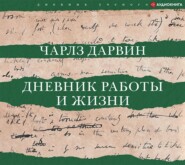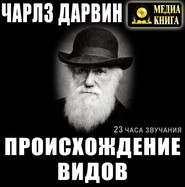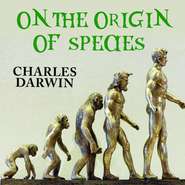По всем вопросам обращайтесь на: info@litportal.ru
(©) 2003-2024.
✖
Life and Letters of Charles Darwin — Volume 2
Настройки чтения
Размер шрифта
Высота строк
Поля
"A great gun, Flourens, has written a little dull book against me which pleases me much, for it is plain that our good work is spreading in France. He speaks of the "engouement" about this book [the 'Origin'] "so full of empty and presumptuous thoughts." The passage here alluded to is as follows: —
"Enfin l'ouvrage de M. Darwin a paru. On ne peut qu'etre frappe du talent de l'auteur. Mais que d'idees obscures, que d'idees fausses! Quel jargon metaphysique jete mal a propos dans l'histoire naturelle, qui tombe dans le galimatias des qu'elle sort des idees claires, des idees justes. Quel langage pretentieux et vide! Quelles personifications pueriles et surannees! O lucidite! O solidite de l'esprit francais, que devene-vous?"]
1865.
[This was again a time of much ill-health, but towards the close of the year he began to recover under the care of the late Dr. Bence-Jones, who dieted him severely, and as he expressed it, "half-starved him to death." He was able to work at 'Animals and Plants' until nearly the end of April, and from that time until December he did practically no work, with the exception of looking over the 'Origin of Species' for a second French edition. He wrote to Sir J.D. Hooker: — "I am, as it were, reading the 'Origin' for the first time, for I am correcting for a second French edition: and upon my life, my dear fellow, it is a very good book, but oh! my gracious, it is tough reading, and I wish it were done." (Towards the end of the year my father received the news of a new convert to his views, in the person of the distinguished American naturalist Lesquereux. He wrote to Sir J.D. Hooker: "I have had an enormous letter from Leo Lesquereux (after doubts, I did not think it worth sending you) on Coal Flora. He wrote some excellent articles in 'Silliman' against 'Origin' views; but he says now, after repeated reading of the book, he is a convert!")
The following letter refers to the Duke of Argyll's address to the Royal Society of Edinburgh, December 5th, 1864, in which he criticises the 'Origin of Species.' My father seems to have read the Duke's address as reported in the "Scotsman" of December 6th, 1865. In a letter to my father (January 16, 1865, 'Life,' vol. ii. page 385), Lyell wrote, "The address is a great step towards your views — far greater, I believe, than it seems when read merely with reference to criticisms and objections."]
CHARLES DARWIN TO C. LYELL. Down, January 22, [1865].
My dear Lyell,
I thank you for your very interesting letter. I have the true English instinctive reverence for rank, and therefore liked to hear about the Princess Royal. ("I had... an animated conversation on Darwinism with the Princess Royal, who is a worthy daughter of her father, in the reading of good books, and thinking of what she reads. She was very much au fait at the 'Origin,' and Huxley's book, the 'Antiquity,' etc." — (Lyell's 'Life,' vol. ii. page 385.) You ask what I think of the Duke's address, and I shall be glad to tell you. It seems to me EXTREMELY clever, like everything I have read of his; but I am not shaken — perhaps you will say that neither gods nor men could shake me. I demur to the Duke reiterating his objection that the brilliant plumage of the male humming-bird could not have been acquired through selection, at the same time entirely ignoring my discussion (page 93, 3rd edition) on beautiful plumage being acquired through SEXUAL selection. The duke may think this insufficient, but that is another question. All analogy makes me quite disagree with the Duke that the difference in the beak, wing and tail, are not of importance to the several species. In the only two species which I have watched, the difference in flight and in the use of the tail was conspicuously great.
The Duke, who knows my Orchid book so well, might have learnt a lesson of caution from it, with respect to his doctrine of differences for mere variety or beauty. It may be confidently said that no tribe of plants presents such grotesque and beautiful differences, which no one until lately, conjectured were of any use; but now in almost every case I have been able to show their important service. It should be remembered that with humming birds or orchids, a modification in one part will cause correlated changes in other parts. I agree with what you say about beauty. I formerly thought a good deal on the subject, and was led quite to repudiate the doctrine of beauty being created for beauty's sake. I demur also to the Duke's expression of "new births." That may be a very good theory, but it is not mine, unless indeed he calls a bird born with a beak 1/100th of an inch longer than usual "a new birth;" but this is not the sense in which the term would usually be understood. The more I work the more I feel convinced that it is by the accumulation of such extremely slight variations that new species arise. I do not plead guilty to the Duke's charge that I forget that natural selection means only the preservation of variations which independently arise. ("Strictly speaking, therefore, Mr. Darwin's theory is not a theory on the Origin of Species at all, but only a theory on the causes which lead to the relative success and failure of such new forms as may be born into the world." — "Scotsman", December 6, 1864.) I have expressed this in as strong language as I could use, but it would have been infinitely tedious had I on every occasion thus guarded myself. I will cry "peccavi" when I hear of the Duke or you attacking breeders for saying that man has made his improved shorthorns, or pouter pigeons, or bantams. And I could quote still stronger expressions used by agriculturists. Man does make his artificial breeds, for his selective power is of such importance relatively to that of the slight spontaneous variations. But no one will attack breeders for using such expressions, and the rising generation will not blame me.
Many thanks for your offer of sending me the 'Elements.' (Sixth edition in one volume.) I hope to read it all, but unfortunately reading makes my head whiz more than anything else. I am able most days to work for two or three hours, and this makes all the difference in my happiness. I have resolved not to be tempted astray, and to publish nothing till my volume on Variation is completed. You gave me excellent advice about the footnotes in my Dog chapter, but their alteration gave me infinite trouble, and I often wished all the dogs, and I fear sometimes you yourself, in the nether regions.
We (dictator and writer) send our best love to Lady Lyell.
Yours affectionately, CHARLES DARWIN.
P.S. — If ever you should speak with the Duke on the subject, please say how much interested I was with his address.
[In his autobiographical sketch my father has remarked that owing to certain early memories he felt the honour of being elected to the Royal and Royal Medical Societies of Edinburgh "more than any similar honour." The following extract from a letter to Sir Joseph Hooker refers to his election to the former of these societies. The latter part of the extract refers to the Berlin Academy, to which he was elected in 1878: —
"Here is a really curious thing, considering that Brewster is President and Balfour Secretary. I have been elected Honorary Member of the Royal Society of Edinburgh. And this leads me to a third question. Does the Berlin Academy of Sciences send their Proceedings to Honorary Members? I want to know, to ascertain whether I am a member; I suppose not, for I think it would have made some impression on me; yet I distinctly remember receiving some diploma signed by Ehrenberg. I have been so careless; I have lost several diplomas, and now I want to know what Societies I belong to, as I observe every [one] tacks their titles to their names in the catalogue of the Royal Soc."]
CHARLES DARWIN TO C. LYELL. Down, February 21 [1865].
My dear Lyell,
I have taken a long time to thank you very much for your present of the 'Elements.'
I am going through it all, reading what is new, and what I have forgotten, and this is a good deal.
I am simply astonished at the amount of labour, knowledge, and clear thought condensed in this work. The whole strikes me as something quite grand. I have been particularly interested by your account of Heer's work and your discussion on the Atlantic Continent. I am particularly delighted at the view which you take on this subject; for I have long thought Forbes did an ill service in so freely making continents.
I have also been very glad to read your argument on the denudation of the Weald, and your excellent resume on the Purbeck Beds; and this is the point at which I have at present arrived in your book. I cannot say that I am quite convinced that there is no connection beyond that pointed out by you, between glacial action and the formation of lake basins; but you will not much value my opinion on this head, as I have already changed my mind some half-dozen times.
I want to make a suggestion to you. I found the weight of your volume intolerable, especially when lying down, so with great boldness cut it into two pieces, and took it out of its cover; now could not Murray without any other change add to his advertisement a line saying, "if bound in two volumes, one shilling or one shilling and sixpence extra." You thus might originate a change which would be a blessing to all weak-handed readers.
Believe me, my dear Lyell, Yours most sincerely, CHARLES DARWIN.
Originate a second REAL BLESSING and have the edges of the sheets cut like a bound book. (This was a favourite reform of my father's. He wrote to the "Athenaeum" on the subject, February 5, 1867, pointing out how that a book cut, even carefully, with a paper knife collects dust on its edges far more than a machine-cut book. He goes on to quote the case of a lady of his acquaintance who was in the habit of cutting books with her thumb, and finally appeals to the "Athenaeum" to earn the gratitude of children "who have to cut through dry and pictureless books for the benefit of their elders." He tried to introduce the reform in the case of his own books, but found the conservatism of booksellers too strong for him. The presentation copies, however, of all his later books were sent out with the edges cut.)
CHARLES DARWIN TO JOHN LUBBOCK. Down, June 11 [1865].
My dear Lubbock,
The latter half of your book ('Prehistoric Times,' 1865.) has been read aloud to me, and the style is so clear and easy (we both think it perfection) that I am now beginning at the beginning. I cannot resist telling you how excellently well, in my opinion, you have done the very interesting chapter on savage life. Though you have necessarily only compiled the materials the general result is most original. But I ought to keep the term original for your last chapter, which has struck me as an admirable and profound discussion. It has quite delighted me, for now the public will see what kind of man you are, which I am proud to think I discovered a dozen years ago.
I do sincerely wish you all success in your election and in politics; but after reading this last chapter, you must let me say: oh, dear! oh, dear! oh dear!
Yours affectionately, CH. DARWIN.
P.S. — You pay me a superb compliment ('Prehistoric Times,' page 487, where the words, "the discoveries of a Newton or a Darwin," occur.), but I fear you will be quizzed for it by some of your friends as too exaggerated.
[The following letter refers to Fritz Muller's book, 'Fur Darwin,' which was afterwards translated, at my father's suggestion, by Mr. Dallas. It is of interest as being the first of the long series of letters which my father wrote to this distinguished naturalist. They never met, but the correspondence with Muller, which continued to the close of my father's life, was a source of very great pleasure to him. My impression is that of all his unseen friends Fritz Muller was the one for whom he had the strongest regard. Fritz Muller is the brother of another distinguished man, the late Hermann Muller, the author of 'Die Befruchtung der Blumen,' and of much other valuable work:]
CHARLES DARWIN TO F. MULLER. Down, August 10 [1865].
My dear Sir,
I have been for a long time so ill that I have only just finished hearing read aloud your work on species. And now you must permit me to thank you cordially for the great interest with which I have read it. You have done admirable service in the cause in which we both believe. Many of your arguments seem to me excellent, and many of your facts wonderful. Of the latter, nothing has surprised me so much as the two forms of males. I have lately investigated the cases of dimorphic plants, and I should much like to send you one or two of my papers if I knew how. I did send lately by post a paper on climbing plants, as an experiment to see whether it would reach you. One of the points which has struck me most in your paper is that on the differences in the air-breathing apparatus of the several forms. This subject appeared to me very important when I formerly considered the electric apparatus of fishes. Your observations on Classification and Embryology seem to me very good and original. They show what a wonderful field there is for enquiry on the development of crustacea, and nothing has convinced me so plainly what admirable results we shall arrive at in Natural History in the course of a few years. What a marvellous range of structure the crustacea present, and how well adapted they are for your enquiry! Until reading your book I knew nothing of the Rhizocephala; pray look at my account and figures of Anelasma, for it seems to me that this latter cirripede is a beautiful connecting link with the Rhizocephala.
If ever you have any opportunity, as you are so skilful a dissector, I much wish that you would look to the orifice at the base of the first pair of cirrhi in cirripedes, and at the curious organ in it, and discover what its nature is; I suppose I was quite in error, yet I cannot feel fully satisfied at Krohn's (See vol. ii., pages 138, 187.) observations. Also if you ever find any species of Scalpellum, pray look for complemental males; a German author has recently doubted my observations for no reason except that the facts appeared to him so strange.
Permit me again to thank you cordially for the pleasure which I have derived from your work and to express my sincere admiration for your valuable researches.
Believe me, dear Sir, with sincere respect, Yours very faithfully, CH. DARWIN.
P.S. — I do not know whether you care at all about plants, but if so, I should much like to send you my little work on the 'Fertilization of Orchids,' and I think I have a German copy.
Could you spare me a photograph of yourself? I should much like to possess one.
CHARLES DARWIN TO J.D. HOOKER. Down, Thursday, 27th [September, 1865].
My dear Hooker,
I had intended writing this morning to thank Mrs. Hooker most sincerely for her last and several notes about you, and now your own note in your hand has rejoiced me. To walk between five and six miles is splendid, with a little patience you must soon be well. I knew you had been very ill, but I hardly knew how ill, until yesterday, when Bentham (from the Cranworths (Robert Rolfe, Lord Cranworth, and Lord Chancellor of England, lived at Holwood, near Down.)) called here, and I was able to see him for ten minutes. He told me also a little about the last days of your father (Sir William Hooker; 1785-1865. He took charge of the Royal Gardens at Kew, in 1840, when they ceased to be the private gardens of the Royal Family. In doing so, he gave up his professorship at Glasgow — and with it half of his income. He founded the herbarium and library, and within ten years he succeeded in making the gardens the first in the world. It is, thus, not too much to say that the creation of the establishment at Kew is due to the abilities and self-devotion of Sir William Hooker. While, for the subsequent development of the gardens up to their present magnificent condition, the nation must thank Sir Joseph Hooker, in whom the same qualities are so conspicuous.); I wish I had known your father better, my impression is confined to his remarkably cordial, courteous, and frank bearing. I fully concur and understand what you say about the difference of feeling in the loss of a father and child. I do not think any one could love a father much more than I did mine, and I do not believe three or four days ever pass without my still thinking of him, but his death at eight-four caused me nothing of that insufferable grief (I may quote here a passage from a letter of November, 1863. It was written to a friend who had lost his child: "How well I remember your feeling, when we lost Annie. It was my greatest comfort that I had never spoken a harsh word to her. Your grief has made me shed a few tears over our poor darling; but believe me that these tears have lost that unutterable bitterness of former days.") which the loss of our poor dear Annie caused. And this seems to me perfectly natural, for one knows for years previously that one's father's death is drawing slowly nearer and nearer, while the death of one's child is a sudden and dreadful wrench. What a wonderful deal you read; it is a horrid evil for me that I can read hardly anything, for it makes my head almost immediately begin to sing violently. My good womenkind read to me a great deal, but I dare not ask for much science, and am not sure that I could stand it. I enjoyed Tylor ('Researches into the Early History of Mankind,' by E.B. Tylor. 1865.) EXTREMELY, and the first part of Lecky 'The Rise of Rationalism in Europe,' by W.E.H. Lecky. 1865.); but I think the latter is often vague, and gives a false appearance of throwing light on his subject by such phrases as "spirit of the age," "spread of civilization," etc. I confine my reading to a quarter or half hour per day in skimming through the back volumes of the Annals and Magazine of Natural History, and find much that interests me. I miss my climbing plants very much, as I could observe them when very poorly.
I did not enjoy the 'Mill on the Floss' so much as you, but from what you say we will read it again. Do you know 'Silas Marner'? it is a charming little story; if you run short, and like to have it, we could send it by post... We have almost finished the first volume of Palgrave (William Gifford Palgrave's 'Travels in Arabia,' published in 1865.), and I like it much; but did you ever see a book so badly arranged? The frequency of the allusions to what will be told in the future are quite laughable... By the way, I was very much pleased with the foot-note (The passage which seems to be referred to occurs in the text (page 479) of 'Prehistoric Times.' It expresses admiration of Mr. Wallace's paper in the 'Anthropological Review' (May, 1864), and speaks of the author's "characteristic unselfishness" in ascribing the theory of Natural Selection "unreservedly to Mr. Darwin." about Wallace in Lubbock's last chapter. I had not heard that Huxley had backed up Lubbock about Parliament... Did you see a sneer some time ago in the "Times" about how incomparably more interesting politics were compared with science even to scientific men? Remember what Trollope says, in 'Can you Forgive her,' about getting into Parliament, as the highest earthly ambition. Jeffrey, in one of his letters, I remember, says that making an effective speech in Parliament is a far grander thing than writing the grandest history. All this seems to me a poor short-sighted view. I cannot tell you how it has rejoiced me once again seeing your handwriting — my best of old friends.
Yours affectionately, CH. DARWIN.
[In October he wrote Sir J.D. Hooker: —
"Talking of the 'Origin,' a Yankee has called my attention to a paper attached to Dr. Wells's famous 'Essay on Dew,' which was read in 1813 to the Royal Society, but not [then] printed, in which he applies most distinctly the principle of Natural Selection to the Races of Man. So poor old Patrick Matthew is not the first, and he cannot, or ought not, any longer to put on his title-pages, 'Discoverer of the principle of Natural Selection'!"]
CHARLES DARWIN TO F.W. FARRAR. (Canon of Westminster.) Down, November 2 [1865?].
Dear Sir,
As I have never studied the science of language, it may perhaps seem presumptuous, but I cannot resist the pleasure of telling you what interest and pleasure I have derived from hearing read aloud your volume ('Chapters on Language,' 1865.)
I formerly read Max Muller, and thought his theory (if it deserves to be called so) both obscure and weak; and now, after hearing what you say, I feel sure that this is the case, and that your cause will ultimately triumph. My indirect interest in your book has been increased from Mr. Hensleigh Wedgwood, whom you often quote, being my brother-in-law.





